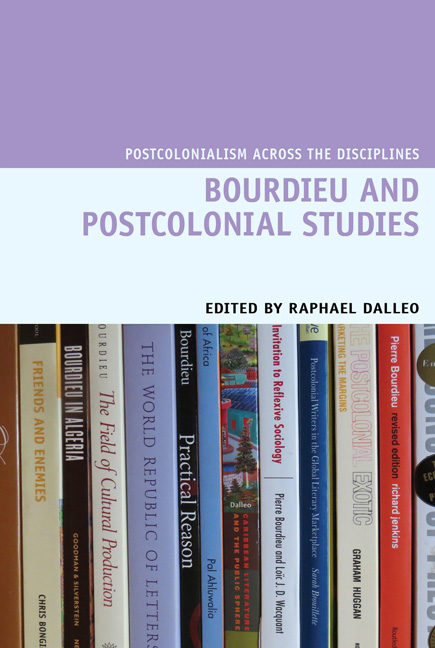Book contents
- Frontmatter
- Contents
- Permissions
- Introduction
- 1 Writing at the Margins: Postcolonialism, Exoticism and the Politics of Cultural Value (from The Postcolonial Exotic)
- 2 Exiles on Main Stream: Valuing the Popularity of Postcolonial Literature (from Friends and Enemies)
- 3 Postcolonial Authorship Revisited (from Postcolonial Writers in the Global Literary Marketplace)
- 4 Bourdieu and Fanon on Algeria
- 5 Style as Habitus: World Literature, Decolonization and Caribbean Voices
- 6 Playing the Game? The Publication of Oswald Mtshali
- 7 Fields in Formation: English Studies and National Literature in South Africa (with a Brazilian Comparison)
- 8 Archived Relationships: Pierre Bourdieu and Writers of the Caribbean Diaspora
- 9 Irony in the Dungeon: Anamnesis and Emancipation
- About the Contributors
- Index
Introduction
- Frontmatter
- Contents
- Permissions
- Introduction
- 1 Writing at the Margins: Postcolonialism, Exoticism and the Politics of Cultural Value (from The Postcolonial Exotic)
- 2 Exiles on Main Stream: Valuing the Popularity of Postcolonial Literature (from Friends and Enemies)
- 3 Postcolonial Authorship Revisited (from Postcolonial Writers in the Global Literary Marketplace)
- 4 Bourdieu and Fanon on Algeria
- 5 Style as Habitus: World Literature, Decolonization and Caribbean Voices
- 6 Playing the Game? The Publication of Oswald Mtshali
- 7 Fields in Formation: English Studies and National Literature in South Africa (with a Brazilian Comparison)
- 8 Archived Relationships: Pierre Bourdieu and Writers of the Caribbean Diaspora
- 9 Irony in the Dungeon: Anamnesis and Emancipation
- About the Contributors
- Index
Summary
Postcolonial studies looks forward to a future to be achieved—‘history has not yet arrived at the post-imperial era’ (Young 27)—and at the same time can seem dated, too oriented towards colonial structures of the past to offer insight into a rapidly changing neoliberal present. Already by the early 1990s, Ella Shohat's ‘Notes on the “Post-Colonial”’ (1992) was making the argument that the postcolonial framework was unable to account for the renewed imperialism represented by the Gulf War, while Arif Dirlik's ‘The Postcolonial Aura’ (1994) charged that ‘postcolonial critics […] have had little to say about [imperialism's] contemporary figurations’ (356), namely ‘the emergence of what has been described variously as global capitalism, flexible production, late capitalism, and so on’ (330). Neil Lazarus's The Postcolonial Unconscious(2011) updates this criticism, that ‘developments in the first decade of our new century—above all the US-led and -sponsored invasion and occupation of Iraq and the sorry misadventure in Afghanistan—have exposed the contradictions of this established postcolonialist understanding to stark and unforgiving light’ (15). While postcolonialism can thus seem unable to keep up with the times, Bourdieu and Postcolonial Studiesmakes the case that the field has begun to substantially change during the twenty-first century. One of the most important developments during this period has been the emergence of sociological approaches to postcolonial studies engaging with the work of Pierre Bourdieu that offer an opportunity to redefine postcolonialism's potential for intervention and critique.
Lazarus attributes much of postcolonialism's limitations to its development in ‘an institutionally specific, conjuncturally determined’ moment, when ‘after 1975, the prevailing political sentiment in the West turned sharply against anticolonial nationalist insurgency and revolutionary anti-imperialism’ (9). In this context, the complex theoricity of what Lazarus calls ‘“post”-theory,’ suddenly ascendant in the academy, ‘seemed to offer what the old, presumptively discredited “modern” systems of thought—all of them, left, right, and centre—evidently could not: a counter-narrative to the “new world order” of such as Reagan and Thatcher, a different basis for counter-action’ (186). Lazarus's narrative explains how postcolonial studies emerged as an academic field in the 1980s with figures like Edward Said, Gayatri Spivak and Homi Bhabha adapting the poststructuralist thought of Foucault, Derrida and Lacan.
- Type
- Chapter
- Information
- Bourdieu and Postcolonial Studies , pp. 1 - 16Publisher: Liverpool University PressPrint publication year: 2016



